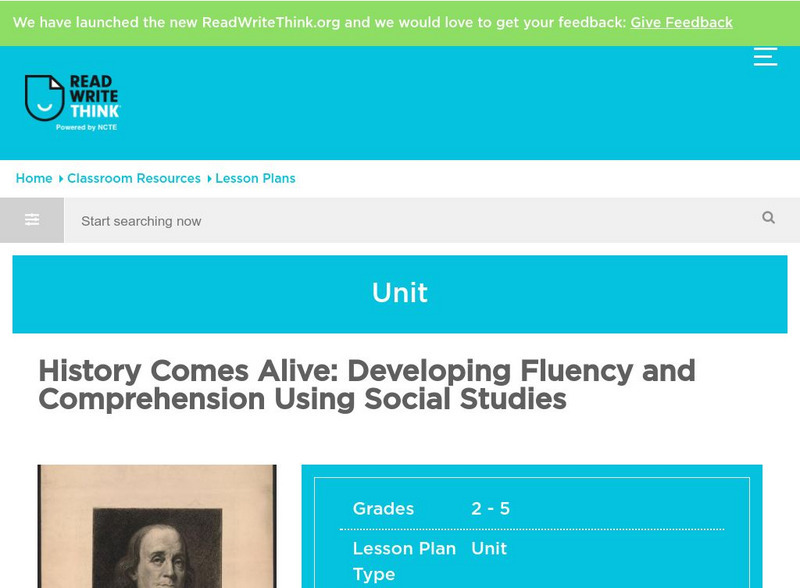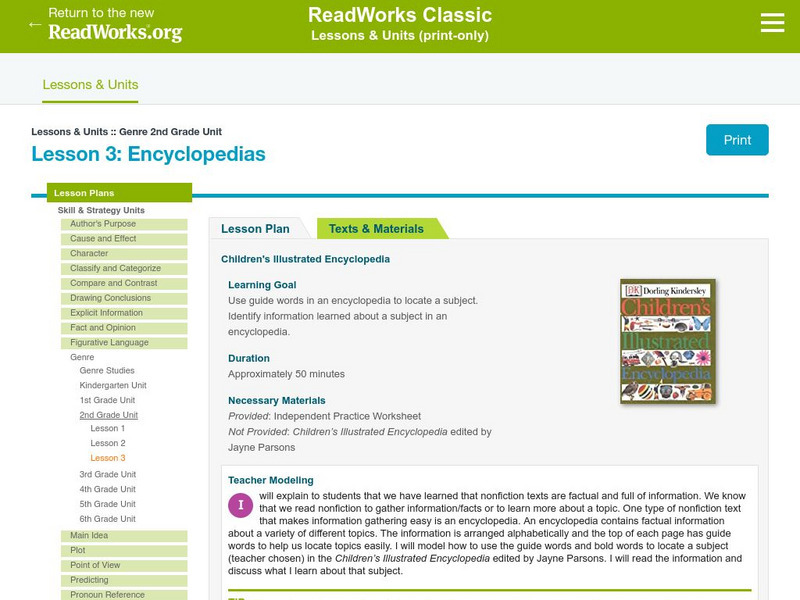Hi, what do you want to do?
Polk Bros Foundation
How to Summarize a Non-Fiction Passage
After reading a text, one way to find out how much your class comprehended is to ask your pupils to summarize. This worksheet helps class members prepare for writing a summary of a nonfiction text. They note down the topic, up to eight...
Curated OER
Reading Comprehension: Guinness Book of World Records
If your learners are curious about human achievement, superlatives, or esoteric trivia, the Guinness Book of Records is a way to tap into instrinsic motivation and relevance. Here's an informational reading that will grab their attention...
Curated OER
Researching the Past
Learners research the western movement in order to learn note taking strategies with nonfiction texts. They use the Internet to search for important information about the western movement using the Cornell Notes note-taking system. They...
Curated OER
Find the Main Idea
It's important for learners to be able to identify the main point in an article, paper, or essay. Start by having them identify the main idea in a short paragraph. There are three short paragraphs (each with four multiple choice options)...
Curated OER
Let There Be Peace: Nobel Prize Winners
What is the Nobel Peace Prize? After they establish criteria for great leadership, secondary learners read a New York Times article about President Jimmy Carter's acceptance of the Nobel Peace Prize in 2002. Individuals research the...
Curated OER
Analyzing Two or More Nonfiction Texts
How does recognizing the author's purpose help you draw conclusions about a topic? Using two articles (both are attached), learners brainstorm why each author wrote each article. Are their purposes similar or different? Learners use a...
Curated OER
Locate Key Information in Nonfiction Text
Interpret nonfiction text with your class. Readers use key information found in nonfiction text to answer questions and problem solve. They utilize the chapter headings, diagrams, glossary, maps, and captions as well as the table of...
Curated OER
The Final Analysis: Cause and Effect, Fact and Opinion
Middle schoolers read and review informational texts, analyze cause and effect, and distinguish fact from opinion. They assess a "one-minute mystery" you read aloud for cause and effect relationships. Resource includes complete set of...
Polk Bros Foundation
I Can Identify and Support the Main Idea in Non-Ficiton
Analyze a historical or scientific informational text by determining the main idea and supporting details. This graphic organizer allows pupils to write down the main idea and four details.
Curated OER
Planning A Vacation Online
If you could travel anywhere in the United States, where would you go? Use this question to interest your fourth, fifth, and sixth graders as they experiment with Mapquest or other direction-based resources. They choose where they'd like...
Curated OER
Elementary Reading: Five Passages with Questions
Five brief readings with questions support practice with various literacy skills. In some cases, learners identify whether underlined words are spelled correctly. Other times, they answer reading comprehension questions about the text or...
Curated OER
Using Details from Nonfiction Text to Organize Sequence of Events
Is it important to do things in a certain order? Yes, especially when making a peanut butter and jelly sandwich. Or so your class will learn in a lesson plan on sequencing. After guided practice, class members generate their own “how-to”...
Curated OER
Insects
It's a fact: kids love bugs! With this lesson, young learners explore reading informational texts and conducting research while learning about their favorite insects. Spark learners' interest by reading a book about one kind of bug and...
Curated OER
Organizational Structures of Nonfiction Text/Graphic Organizers
Fifth graders review the characteristics of a nonfiction text. In this language arts lesson, 5th graders understand that one can use a specific graphic organizer to help them in understanding an organizational structure. For example, in...
Pennsylvania Department of Education
Analyzing Key Ideas and Details in Nonfiction
Learners explore nonfiction texts. In this language arts lesson, students read a nonfiction text and make predictions. Learners identify facts and opinions in the text and draw conclusions as they read.
Curated OER
Reading Comprehension Practice: Nonfiction Text
Students practice their reading comprehension. In this reading comprehension lesson, students read or listen to a nonfiction article about meditation. This lesson includes discussion questions and comprehension questions.
Curated OER
Conducting Research
Third graders conduct research. In this conducting research lesson, 3rd graders discuss the importance of nonfiction text in providing factual information. Students write questions about an assigned topic and research using informational...
Curated OER
Components of Nonfiction Text
Students locate information in a nonfiction text. In this locating information lesson plan, students locate illustrations, titles, headings, and more using an activity sheet.
Curated OER
Researching Animals Portrayed in Fables
Students research an animal used in fables. In this instructional activity on nonfiction texts, students use the Internet to find information about an animal to help them complete a Research Response Sheet.
Curated OER
Habitat Hunt
Third graders read several nonfiction texts and practice finding the main idea for the text as well as learn about various habitats. In this main idea lesson, 3rd graders read several nonfiction texts and make habitat cards. Students...
Curated OER
Sum Stuff
Students are introduced to informational text. Students explore nonfiction as a genre. They identify the components and text structure of text nonfiction. Students read a nonfiction passage and write a summary of the passage.
ReadWriteThink
Read Write Think: History Comes Alive: Developing Fluency and Comprehension
Let the power of imagination and inference serve as a "time machine" to bring Benjamin Franklin into the classroom! History and science come to life in a dialogue with Franklin the inventor, developed through lesson activities that...
Read Works
Read Works: Genre 2nd Grade Unit: Encyclopedias
[Free Registration/Login Required] A lesson in which students use the book Children's Illustrated Encyclopedia edited by Jayne Parsons to learn to locate information and find facts about a subject in an encyclopedia. Lesson includes...
ReadWriteThink
Read Write Think: Reading Informational Texts Using the 3 2 1 Strategy
Students can count on using the 3-2-1 strategy to help them successfully comprehend and write about an informational text.




























